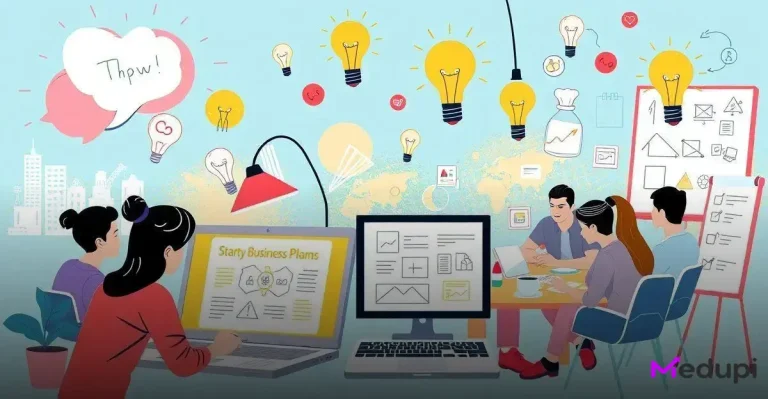ADVERTISEMENT
Entrepreneurship ideas for students are gaining traction, opening new avenues for young innovators.
As students embrace the entrepreneurial spirit, they position themselves to create impactful businesses that cater to their passions and the needs of their communities.
ADVERTISEMENT
What is entrepreneurship?
Entrepreneurship is the process of starting and running a business to make a profit. It involves taking risks, being innovative, and finding opportunities in the market.
Students who engage in entrepreneurship can develop valuable skills such as problem-solving, marketing, and financial management.
ADVERTISEMENT
By exploring various business ideas, they can learn how to create products or services that meet the needs of customers.
Understanding the basics of entrepreneurship helps students think critically and prepare for future challenges in the business world.
Why students should pursue entrepreneurship

Students should pursue entrepreneurship for many compelling reasons. First and foremost, it offers a unique opportunity to turn their passions into real, thriving businesses. By creating something they truly care about, students form a deep emotional connection to their work, which enhances motivation and fulfillment. This personal investment in their ventures often leads to greater perseverance and dedication, essential qualities for long-term success.
Furthermore, entrepreneurship equips students with essential life skills that extend beyond the business world. Skills like time management, effective communication, financial literacy, and problem-solving are critical not only for running a business but for personal and professional development. By navigating the complexities of entrepreneurship, students develop a versatile skill set that will serve them well in any career path they choose to follow.
In addition, entrepreneurship has the potential to positively impact local communities through job creation. As students develop and grow their business ideas, they may find themselves in a position to hire others, thereby contributing to local economic development. This fosters a sense of responsibility and community engagement, helping students recognize the importance of giving back and supporting those around them.
Entrepreneurship also fosters resilience and confidence—two vital traits in today’s competitive job market. By facing and overcoming challenges, students learn to adapt, think critically, and handle setbacks. These experiences help them build the mental toughness necessary for both entrepreneurial ventures and broader career aspirations.
Moreover, entrepreneurship encourages innovation, which is often driven by students’ fresh perspectives and their close connection to current trends and technologies. Younger generations are frequently more attuned to emerging industries, consumer behaviors, and technological advancements, allowing them to identify and address real-world problems that older generations may overlook. This innovative mindset not only drives personal success but can also lead to broader societal contributions.
Top ideas for student entrepreneurs
There are many exciting entrepreneurship ideas for students to explore. One great idea is starting a blog or YouTube channel about a subject they love. This not only allows them to share their passions but also helps them learn about marketing and content creation, highlighting some Characteristics of Entrepreneurship such as creativity and innovation.
Another idea is launching a mobile car wash service. This business requires minimal investment and can serve busy people who need convenient options to keep their cars clean. Students can advertise on social media to attract customers, demonstrating Characteristics of Entrepreneurship like adaptability and problem-solving.
Students can also create and sell handmade products, like jewelry or art. Platforms like Etsy make it easy to reach buyers. This enables them to exercise their creativity while learning about e-commerce, showcasing entrepreneurial traits like resourcefulness and initiative.
Moreover, offering tutoring services in subjects they excel at can be a fulfilling business. Helping fellow students while earning money can provide a great balance, reflecting the Characteristics of Entrepreneurship such as empathy and leadership.
Lastly, organizing local events or workshops can meet community needs. They can focus on skills such as coding or art, providing value while developing leadership experience, another key characteristic of entrepreneurship.
How to validate your business idea

Validating your business idea is a crucial step in becoming a successful entrepreneur. First, you should conduct market research. This means looking at existing products or services to see if your idea fills a gap or improves what is already available. Talk to potential customers to understand their needs and pain points.
Next, create a minimum viable product (MVP). This is a simple version of your product that includes just enough features to attract early adopters. Tools like surveys and prototypes can help you gather feedback. Use this information to improve your offering.
Another important step is to analyze your competition. Look at similar businesses to see what they do well and what they lack. This insight can help you identify unique features for your idea.
Finally, calculate the potential profitability. Estimate costs and sales to see if your idea can make money. If your research and tests show promise, you’ll be better prepared to take your business idea to the next level.
Resources for Aspiring Student Entrepreneurs
Resources for aspiring student entrepreneurs are essential for building successful businesses. Start by exploring online platforms like Coursera and Udemy that offer courses on entrepreneurship and business management. These courses often include insights from experienced entrepreneurs and can help students understand key concepts.
Another great resource is joining entrepreneurship clubs at school. These clubs provide networking opportunities, mentorship, and support from peers who share similar goals. Students can learn from each other’s experiences and collaborate on projects.
Additionally, local business incubators and accelerators often have programs designed specifically for young entrepreneurs. They may offer workshops, funding opportunities, and access to valuable networks.
Reading books about entrepreneurship is also important. Books like The Lean Startup and Start with Why provide practical advice and inspiration. These resources can motivate students to think differently about their business ideas.
Finally, online forums and communities like Reddit and LinkedIn groups can connect students with seasoned entrepreneurs who share insights, provide feedback, and offer guidance, helping them navigate the challenges of entrepreneurship.
Empowering the next generation of entrepreneurs
Entrepreneurship is a journey filled with challenges and opportunities. For students, embracing this path can lead to personal growth, valuable skills, and even successful businesses. Entrepreneurship ideas for students can serve as a launching pad for their ventures.
By exploring various ideas and validating them through research, students can develop strong foundations for their businesses. Utilizing resources such as online courses, mentorship programs, and community support plays a crucial role in their success.
As young entrepreneurs, they should remain open to learning and adapting, empowering them to navigate the business world effectively. With passion, creativity, and determination, student entrepreneurs can make a significant impact in their communities and beyond. ghnvb.





